Fifa Club World Cup: Global challenge awaits Ayman Ben Mohamed
- Published
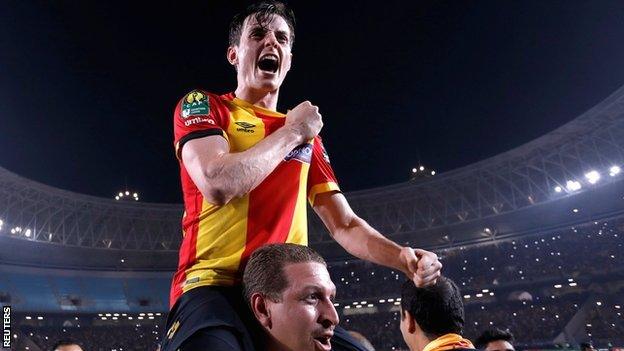
Ayman Ben Mohamed celebrates winning the African Champions League with Esperance
The thought of facing Real Madrid in this month's Fifa Club World Cup might strike fear into some footballers - but not if your nickname is 'Braveheart', like Esperance's half-Irish defender Ayman Ben Mohamed.
On Saturday, the reigning African champions open their Club World Cup campaign against United Arab Emirates champions Al Ain.
A win would put the Tunisians up against South American champions River Plate and should they cross that sizeable bridge, they could meet Luka Modric, Gareth Bale, Sergio Ramos and co in the 22 December final.
"Hopefully we do come up against Real Madrid," Ben Mohamed, 24, told BBC Sport Africa.
"It's a good challenge. We're very excited about coming up against the top teams.
"African teams in general don't do well in the tournament. This year we're going to try to be an exception."
Born in London, raised in Dublin and now based in Africa, Ben Mohamed's football journey is an unusual one. While the left-back may represent Tunisia at international level, he has not forgotten his roots in Ireland.
"I wouldn't say I'm 100% Tunisian," he explains. "At the end of the day my mother is Irish and I was raised in Ireland - and I'm proud of that.
"Although I play for the Tunisian national team I still consider myself Irish at the same time and I'm proud of that as well."
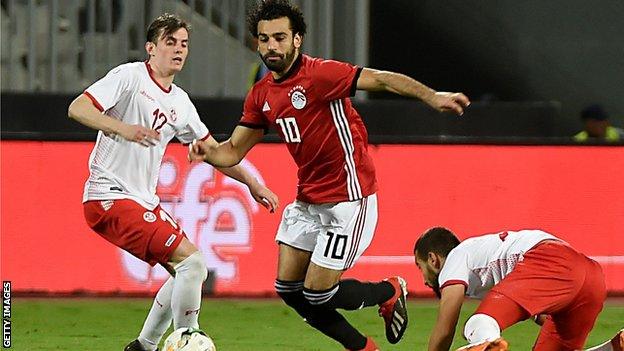
Ben Mohamed's Tunisia were beaten by Mohamed Salah's Egypt in a Nations Cup qualifier last month
Having grown up in very distant climes to those of North Africa, Ben Mohamed served a tough apprenticeship in the rugged conditions of the League of Ireland before moving to the Tunisian capital in 2016.
"Even growing up in Ireland I knew of Esperance - my dad was a supporter," he explained. "I wouldn't say I really followed them closely, but I did follow Tunisian football to some extent."
Last month, he wrote his name into club folklore after helping overturn a 3-1 deficit against Egypt's Al Ahly in the two-legged African Champions League final to dramatically win the title as 4-3 aggregate winners.
"It's an incredible feeling, to be a Champions League winner," says a man whose childhood heroes included Steven Gerrard and former Chelsea and Republic of Ireland winger Damien Duff.
"I've always loved football and had a passion for it for as long as I can remember. I used to play every day on the street with friends."
I play for Tunisia, but still consider myself Irish - Ayman Ben Mohamed
His talent did not go unnoticed.
In 2007-08, playing alongside older boys, the diminutive 12-year-old was part of a school under-14s team that won the regional Leinster Cup and made it to that year's All-Ireland final.
"Ayman as a pupil here was a very quiet, polite, respectful young man," Oisin Mac Eoin, his coach at Dublin's St Benildus College told Sport Africa. "He always had the qualities that were necessary to make it at the highest level."
One of these included an exemplary attitude, with Mac Eoin remembering how Ben Mohamed improved so much during the season that he forced his way into the starting line-up for the final.
"I distinctly remember talking to Ayman before the game," the coach recalls.
"He was pulling up his sleeves because the jersey didn't fit him. I said to him, 'Ayman, you're starting today for the first time - it's the All-Ireland final, I have 100% faith in you. How are you feeling about it?'
"He looked at me and he said, 'Mr Mac Eoin, you believe in me, that's enough for me. I promise I will give 110%' - and that's what he did every game. He had the heart of a lion."
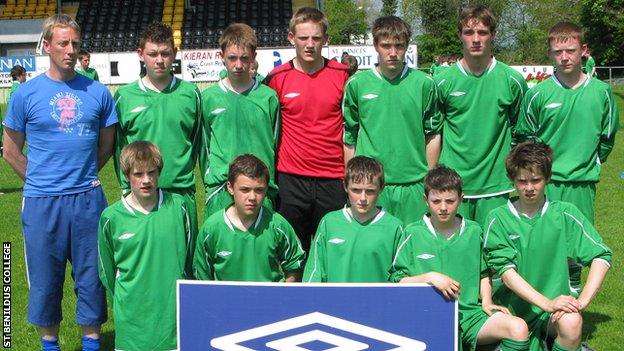
St Benildus coach Mac Eoin remembers Ben Mohamed (front row, second from right) showing an exemplary attitude when contesting a regional Irish cup final in 2008
"In Irish we say 'he who is not big and strong must be resourceful', and Ayman was very, very resourceful on the pitch. He used his attributes: his pace, energy, bravery. That fighting spirit was with him from the very start."
This spirit has earned him the nickname 'Braveheart' at Esperance, a comparison to Mel Gibson's portrayal of Scottish freedom fighter William Wallace in the 1995 Oscar-winning film of the same name.
Ben Mohamed was just 17 when he joined his first League of Ireland side, University College Dublin, before moving to Longford Town three years later and then on to 11-time champions Bohemians.
Yet making it to the top tier of Irish football was far from plain sailing.
"There were plenty of times when I was younger when I thought 'this is probably not for me'," explains a man whose quiet and thoughtful persona off the pitch belies his tenacity on it.
"I was playing at one club and thought I was being mistreated - they put me in the second team and said I was too small. The approach, especially at youth level, is very wrong. They prefer a big player over a technically-gifted player.
"There were some racial issues as well because I'm from a different background. I didn't believe I could become a player."
But it was Ben Mohamed's mixed heritage that ended up paving the way for his pathway to Tunisia and, hence, the Club World Cup.
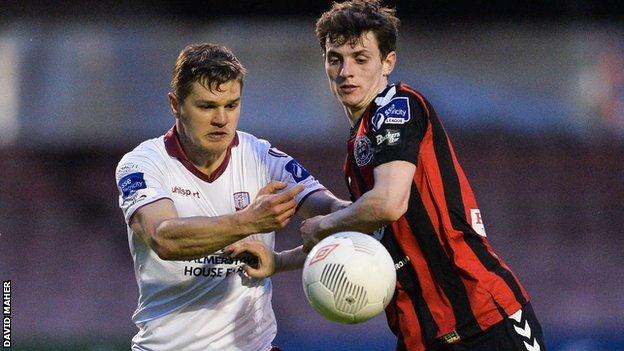
Ayman Mohamed's career included a spell with Ireland's most successful side - Bohemians
"I was playing for Bohemians and studying in college at the same time - I had exams and was in the library trying to cram all my last-minute studying," he says.
"I got a call from a Tunisian number and it turned out to be someone from the Tunisian FA. They had been following me and wanted to call me up for national team duty. That was a surprise. I was delighted and didn't think twice."
His international call-up paved the way for the move to Esperance.
"It wasn't easy," he says of the decision. "It was the first time moving away from family and being away from home. I found it very difficult at the start: a different language, culture and way of life. Even the style of football was different."
The early part of his career with the club was also disrupted by cruciate ligament and groin injuries that required surgery.
"The fans helped me to get through all the difficult stages. When I got injured they were always behind me, always supporting me. I'm very grateful for that. They definitely have a special place in my heart."
His journey from Irish semi-pro to African champion is still sinking in, but the next challenge is imminent.
"I'm really excited about the Fifa Club World Cup - I can't wait for it to come. It's something you dream about, playing in an international tournament like that against champions of other continents."
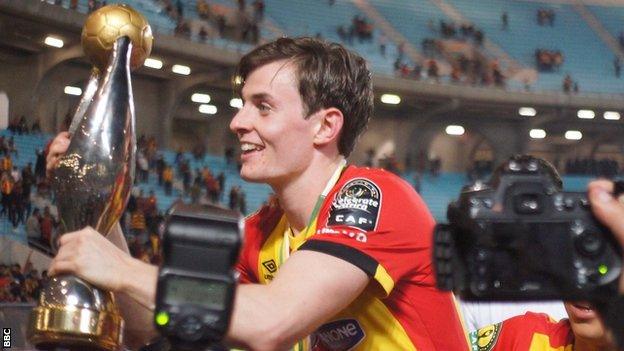
Ayman Ben Mohamed shows off the African Champions League trophy to Esperance fans
Only two African teams have ever reached the final - DR Congo's TP Mazembe in 2010 and Raja Casablanca of Morocco in 2013 - but both lost.
Esperance's only previous appearance, in 2011, was less successful, losing their opening quarter-final to a Qatari side before being defeated by Mexico's Monterrey in the play-off for fifth place.
But Ben Mohamed is determined to see the tournament as an opportunity rather than something to be apprehensive about.
"There will be no stress. No one is expecting anything big from us. It's a great chance to learn."